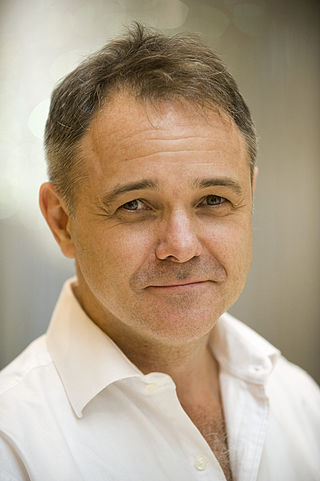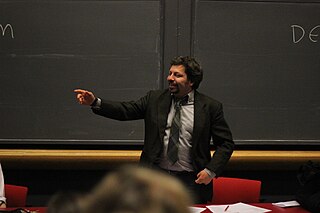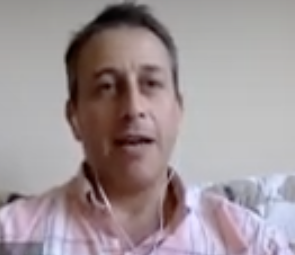Ross Upshur (born 1958) is a Canadian physician and researcher. He is a professor at the Dalla Lana School of Public Health of the University of Toronto in Toronto, Canada, and heads its public health division. [1] [ third-party source needed ]
Ross Upshur (born 1958) is a Canadian physician and researcher. He is a professor at the Dalla Lana School of Public Health of the University of Toronto in Toronto, Canada, and heads its public health division. [1] [ third-party source needed ]
Upshur received a BA in philosophy from the University of Winnipeg in 1982, and an MA, also in philosophy, from Queen's University in 1983; he completed an MD at McMaster University in 1986, and an MSc in epidemiology at the University of Toronto in 1997. [1]
On February 11-12, 2020, Upshur participated in a conference titled “2019 novel Coronavirus Global research and innovation forum: towards a research roadmap” co-hosted by the World Health Organization R&D Blueprint and Global Research Collaboration for Infectious Disease Preparedness (GLOPID-R). He delivered a presentation on ethical considerations for research during the emerging SARS-CoV-2 outbreak, which would go on to be declared as a pandemic one month later. [2]
Upshur is a member of the Ontario COVID-19 Bioethics Table, working closely alongside the Ontario COVID-19 Science Advisory Table. [3]
His book publications include:

James Jude Orbinski, is a Canadian physician, humanitarian activist, author and leading scholar in global health. Orbinski was the 2016-17 Fulbright Visiting professor at the University of California, Irvine, and as of September 1, 2017, he is professor and inaugural director of the Dahdaleh Institute of Global Health Research at York University in Toronto, Ontario, Canada. He was previously the CIGI Chair in Global Health Governance at the Balsillie School of International Affairs and Wilfrid Laurier University (2012-2017), Chair of Global Health at the Dalla Lana School of Public Health (2010-2012) and full professor at the Faculty of Medicine, University of Toronto (2003-2012), where he was the founding Saul Rae Fellow at Massey College. Orbinski's current research interests focus on the health impacts of climate change, medical humanitarianism, intervention strategies around emerging and re-emerging infectious diseases, and global health governance.
The Center for Infectious Disease Research and Policy (CIDRAP) is a center within the University of Minnesota that focuses on addressing public health preparedness and emerging infectious disease response. It was founded in 2001 by Dr. Michael Osterholm, in order to "prevent illness and death from infectious diseases through epidemiological research and rapid translation of scientific information into real-world practical applications and solutions".

Eric Liang Feigl-Ding is an American public health scientist who is currently an epidemiologist and Chief of COVID Task Force at the New England Complex Systems Institute. He was formerly a faculty member and researcher at Harvard Medical School and Harvard T.H. Chan School of Public Health. He is also the Chief Health Economist for Microclinic International, and co-founder of the World Health Network. His research and advocacy have primarily focused on obesity, nutrition, cancer prevention, and biosecurity.

Sir Jeremy James Farrar is a British medical researcher who has served as director of the Wellcome Trust since 2013 and will serve as chief scientist at the World Health Organization in 2023. He was previously a professor of tropical medicine at the University of Oxford.
Prabhat Jha is an Indian-Canadian epidemiologist currently working in the field of global health.
The Global Research Collaboration for Infectious Disease Preparedness (GLOPID-R) is an international initiative to anticipate and prepare for future threats from infectious diseases. Founded in 2013, GLOPID-R is intended to be a means for facilitating communication and collaboration between its member bodies, not a funding or disaster response entity. Its secretariat is funded by the European Union through its Horizon 2020 initiative.
The Coalition for Epidemic Preparedness Innovations (CEPI) is a foundation that takes donations from public, private, philanthropic, and civil society organisations, to finance independent research projects to develop vaccines against emerging infectious diseases (EID).
John Norman Lavis is a Canadian physician based in Toronto, Ontario. He is a tenured professor in the Department of Health Evidence and Impact at McMaster University, where he founded and directs the McMaster Health Forum. He is co-lead of Rapid-Improvement Support and Exchange (RISE).

Syra Madad is an American pathogen preparedness expert and infectious disease epidemiologist. Madad is the Senior Director of the System-wide Special Pathogens Program at NYC Health + Hospitals where she is part of the executive leadership team which oversees New York City's response to the Coronavirus disease 2019 pandemic in the city's 11 public hospitals. She was featured in the Netflix documentary series Pandemic: How to Prevent an Outbreak and the Discovery Channel documentary The Vaccine: Conquering COVID.

Michael Joseph Ryan is an Irish epidemiologist and former trauma surgeon, specialising in infectious disease and public health. He is executive director of the World Health Organization's Health Emergencies Programme, leading the team responsible for the international containment and treatment of COVID-19. Ryan has held leadership positions and has worked on various outbreak response teams in the field to eradicate the spread of diseases including bacillary dysentery, cholera, Crimean–Congo hemorrhagic fever, Ebola, Marburg virus disease, measles, meningitis, relapsing fever, Rift Valley fever, SARS, and Shigellosis.
Allison Joan McGeer is a Canadian infectious disease specialist in the Sinai Health System, and a professor in the Department of Laboratory Medicine and Pathobiology at the University of Toronto. She also appointed at the Dalla Lana School of Public Health and a Senior Clinician Scientist at the Lunenfeld-Tanenbaum Research Institute, and is a partner of the National Collaborating Centre for Infectious Diseases. McGeer has led investigations into the severe acute respiratory syndrome outbreak in Toronto and worked alongside Donald Low. During the COVID-19 pandemic, McGeer has studied how SARS-CoV-2 survives in the air and has served on several provincial committees advising aspects of the Government of Ontario's pandemic response.

The Access to COVID-19 Tools Accelerator, or the Global Collaboration to Accelerate the Development, Production and Equitable Access to New COVID-19 diagnostics, therapeutics and vaccines, is a G20 initiative announced by pro-tem Chair Mohammed al-Jadaan on 24 April 2020. A call to action was published simultaneously by the World Health Organization (WHO) on 24 April. As of January 2022, it was the largest international effort to achieve equitable access to COVID-19 health technologies.

Maria Petronella Gerarda Koopmans is a Dutch virologist who is Head of the Erasmus MC Department of Viroscience. Her research considers emerging infectious diseases, noroviruses and veterinary medicine. In 2018 she was awarded the Netherlands Organisation for Scientific Research (NWO) Stevin Prize. She serves on the scientific advisory group of the World Health Organization.

Nir Eyal is a bioethicist and Henry Rutgers Professor of Bioethics and Director of the Center for Population–Level Bioethics at Rutgers University in New Jersey. He was formerly a bioethicist in the Department of Global Health and Population of the Harvard T.H. Chan School of Public Health and the Department of Global Health and Social Medicine of the Harvard Medical School. He has long worked closely with Harvard bioethicist Daniel Wikler. Eyal's current visibility concerns his role in studying the ethics of human challenge trials in HIV, malaria, and coronavirus vaccine development. He has also written on 'bystander risks' during pandemics and infectious diseases and contract tracing during ebola.
Vivek Goel is the current President and Vice-Chancellor of the University of Waterloo. As a physician and public health researcher, he was also a university administrator, and served as a special advisor to the president and provost of the University of Toronto, and as a professor for the Dalla Lana School of Public Health.
Dr. Shelley Deeks, MD, MHSc, FRCPC, FFAFPM, is a Canadian public health expert who is the chair of the National Advisory Committee on Immunization. Her advertised "specialities include communicable disease control, outbreak investigations, vaccine safety, epidemiology and program evaluation." She is a fellow of the Royal College of Physicians of Canada and the Australian Faculty of Public Health Medicine. Deeks was the executive lead in Ontario's COVID-19 pandemic response in 2020 in her role at Public Health Ontario.

David N. Fisman is a University of Toronto professor in the area of epidemiology at the Dalla Lana School of Public Health. He also works as an infectious disease specialist and consultant at the University Health Network.
Amy Greer is an infectious disease epidemiologist. She is an associate professor in the Department of Population Medicine, Ontario Veterinary College at the University of Guelph. Greer is a Canada Research Chair in Population Disease Modeling.
Anna Banerji M.D., O. Ont. is an academic, a Toronto infectious disease doctor and the president of the Society of Refugee Healthcare Providers.

The Ontario COVID-19 Science Advisory Table, often referred to simply as the Ontario Science Table (OST), was a group of independent scientific experts that provided advice to the Government of Ontario about COVID-19.